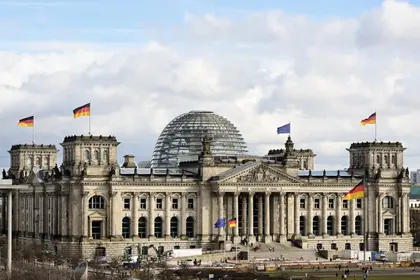President Volodymyr Zelensky said he would try to work with Republican presidential nominee Donald Trump if the latter gets re-elected despite the difficulties, and he noted positive developments with London’s new Labour government in a BBC interview.
The interview, which took place during Zelensky’s UK visit to attend the fourth European Political Community (EPC) on July 18, also covered Zelensky’s perspective on the upcoming peace summit.
JOIN US ON TELEGRAM
Follow our coverage of the war on the @Kyivpost_official.
In response to questions on holding wartime elections – an argument that Moscow has used to question the legitimacy of the Ukrainian government – Zelensky also said he does not rule out the possibility of stepping down as president, but “not until the war is over.”
Here are the key takeaways from Zelensky’s BBC interview:
Trump and Vance’s Republican nomination
Regarding Trump’s potential re-election alongside his running mate, J.D. Vance, who has long been a Ukraine-skeptic, Zelensky said he is willing to work with whomever would assume office in Washington following November’s election.
Zelensky said working with Trump will be “hard work, but we are hard workers.”
On working with Vance, who as a senator has challenged US aid to Ukraine and said in 2022 that he doesn’t care about Ukraine, Zelensky said he would try to work with the “new team” should they get elected.

Zelensky: Trump’s ‘Just and Fair’ Rhetoric on Russia Is ‘Exactly What Putin Is Afraid Of’
“Maybe he really doesn’t understand what goes on in Ukraine, so we have to work with the United States,” Zelensky told the BBC, though it wasn’t clear from the interview if he was referring to Trump or Vance.
Trump, during a speech at the Republican National Convention on Thursday, vowed to end “the horrible war with Russia and Ukraine” without elaborating on how.
Zelensky and Trump were scheduled to have a phone call in the near future, according to Reuters. The call, if true, would mark the first call between the two since Trump left office in 2021.
Cooperation with new Labour government
Zelensky told the BBC that he believes in the new Labour government’s commitment to Ukraine under the UK’s new Prime Minister Keir Starmer, and that he hoped the latter’s government would mark a “special” era in British foreign policy.
“I don’t think Britain’s position would change,” said Zelensky “But I would like for Prime Minister Starmer to become special – speaking about international politics, about defending world security, about the war in Ukraine.”
He added that Ukraine “doesn’t just need a new page, we need power to turn this leaf.”
The Labour government, after assuming office in July following its landslide victory over the Conservatives, has vowed to continue its predecessor’s pro-Ukraine policies.
Zelensky is set to sign a £3.5 billion ($4.5 billion) defense export finance deal with Starmer during his visit, which would include export finance to support the Ukrainian military and bolster defense investments.
On Friday morning, Zelensky briefed the UK’s top ministers on the war in Ukraine and discussed options to prevent oil tankers from breaching Western sanctions imposed on Moscow, becoming the first foreign leader to address the UK cabinet in person since 1997 after former US President Bill Clinton.
During his visit, Zelensky also met with King Charles III of Britain and Valery Zaluzhny, Ukraine’s former commander-in-chief who recently assumed the role of the Ukrainian ambassador to the UK.
Potential peace settlements
Zelensky reiterated his call for Russia to participate in November’s second peace summit.
He told the BBC that other countries would need to help pressure Russia to sit down at the negotiation table.
“It doesn’t mean that all territories are won back by force. I think the power of diplomacy can help,” he said. “By putting pressure on Russia, I think it is possible to agree to a diplomatic settlement.”
Russia recently said it would not attend the second peace summit, instead pushing for terms that effectively call for Kyiv’s capitulation.
You can also highlight the text and press Ctrl + Enter










